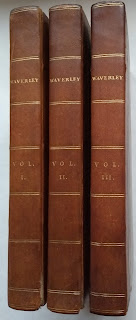Archibald Constable third edition - 1814
At last, I can truly say I have read every volume of Walter Scott's 'Waverley' novels, which stretched from 1814 to 1832. The saying that 'the first shall be last' is proven correct, as reading Waverley brings to an end my marathon journey, which began in January 2020 with Guy Mannering. I read them in chronological order. Why leave Waverley to the end? simply - cost. I now have every single (or triple!) Scott novel in first edition, a few in the original publishers' boards. However, Waverley was the one out of reach of my pocket. I have just looked up the price of first editions on the Internet: there are six copies and they range from £8,251 down to £3,553. I had to settle for a fine third edition, which cost me £206 (including postage).
The novel was probably started in 1808 (Scott gives conflicting versions of the date). He had completed seven chapters but, on showing it to a few friends who unanimously condemned it, he put it aside. When he finally returned to it, he wrote the last two volumes in three weeks. Why had Scott waited so long? Possibly due to the comparatively low prestige of the novel at that time and partly that verse was still regarded the natural medium for narrative. Waverley was a conspicuous success. One reader wrote,
no work that has appeared in my time made such an instant and universal impression...The unexpected newness of the thing, the profusion of original characters, the Scotch language, Scotch men and women, the simplicity of the writing, and the graphic force of the descriptions, all struck us with an electric shock of delight... There was no surprise in its appeal to a reading public becoming bored with Gothic terrors.
The story of the young Edward Waverley, neglected by an ambitious, political father and brought up by a rich, elderly uncle with Jacobite leanings, is that of one drawn to romance through his reading. Although Waverley joins a government regiment in Scotland, he and the novel only really come alive with his visit to his uncle's friend, the Baron of Bradwardine. The latter runs his estate of Tully-Veolan at the foot of the Highlands as a feudal lord, even keeping a Shakespearean fool, Davie Gellatly. Romance follows romance, when Waverley visits the nearby clan Mac-Ivor at Glennaquoich and is dominated by the energy of the patriarchal Fergus and his sister Flora, both fanatically wedded to the Jacobite cause. Bonny Prince Charlie has landed and Fergus, the Baron and others sweep Waverley into the Rebellion. Waverley knows in his heart the cause is hopeless, but the personal charm of the Prince, the dominating Fergus, his love for Flora, all propel him into the ranks of the Jacobite invasion of England. At Prestonpans he saves the life of an English officer and ensures his paroled release to his sick wife back in England. Luckily, the officer Colonel Talbot is able to return the favour and gains Waverley a pardon. Fergus is executed at Carlisle, Flora enters a French convent, and Waverley marries Rose Bradwardine to live happily ever after. His future was accurately prophesied by Flora: a quiet circle of domestic happiness, lettered indolence, and elegant enjoyment of Waverley-Honour, his uncle's estate.
Waverley has all the positive aspects of a Scott novel - character drawing, landscape depiction - with much of the later negative traits kept to a minimum. Two things which personally irritated me throughout the Waverley series, scarcely intrude. Firstly, the placing of (often trite) extracts from others' works, prose or poetic, at the beginning of a chapter, pleasingly does not occur until Chapter XVII (p. 266) of the 3rd Volume - there it is from Shakespeare. This continues until Chapter XXIII. I have felt that often a gobbet from an 'Old Song' or 'Old Tale', have actually been Scott's own material. Secondly, the 'phantom' or 'spirit' of another world only appears to Fergus as the Bodach Glas. The early 19th century is now 200 years gone and the early 21st has very little time for such nonsense, although it is worrying to see Halloween taking over from Guy Fawkes Night these days. I suppose I could add a third positive point - Waverley is blessedly free from the regular infusion of Scott's verse which can so break up the narrative flow in the author's later novels.
Waverley was criticised for its overlong and slow-moving start - the period before Waverley leaves for his regiment. In J.G. Lockhart's Memoirs of Scott, he quotes his father-in-law's claim that he had left the story to flag in the first volume on purpose...to avoid the usual error of novel writers, whose first volume is usually the best. Scott argued in Waverley that the course of Narrative has the earlier events are studiously dwelt upon, that you, kind reader, may be introduced to the characters rather by narrative, than by the duller medium of direct description; but when the story draws near its close, we hurry over the circumstances, however important, which your imagination must have forestalled, and leave you to suppose those things, which it would be abusing your patience to narrate at length.
In his Preface to the Third Edition, the author rebuts the accusation that his portrayal of Callum Beg (Fergus' rapscallion servant) bore hardily upon the Highlanders' national character. Nothing could be further from his wish or intention. The character of Callum Beg is that of a spirit naturally turned to daring evil, and determined, by the circumstances of his situation, to a particular species of mischief.
It is perhaps apt to read, on the penultimate page of the last volume, his praise of Elizabeth Hamilton's Glenburnie (her genius is highly creditable to her country), another work roundly criticised for its portrayal of Highland life and people.


No comments:
Post a Comment